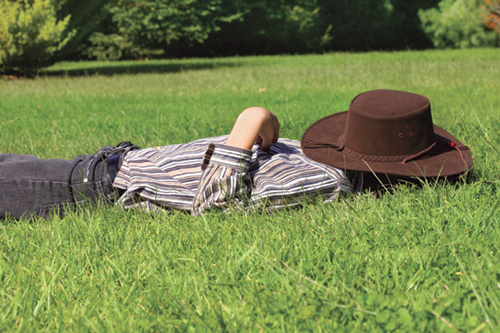
I admit it. I enjoy a good nap. In fact, I have taken a nap almost every day since my freshman year of college, when I had napping down to an art form. I would get home at 11:30 a.m. from my morning classes, eat lunch, and nap from noon to 12:15 p.m. before returning for my afternoon classes. My body clock was so fine-tuned to this ritual that I never used an alarm clock and never overslept.
Once I began teaching, however, I had to move my naps to the late afternoon or early evening after returning home from work. I also had to increase the naptime to 30-45 minutes long. Even if I only have a few minutes before heading back to school for an evening event I’ll squeeze in ten minutes if I can. Although some experts discourage taking a nap within three hours of bedtime, I’ll take one as late as 7:00 p.m. if it means I can be more chipper around my family the rest of the evening, enjoy a television show without nodding off, walk the dog with a little skip in my step, efficiently prepare for the next school day, or read a book and actually remember what I read.
Oddly, even after all of these years there is a tinge of guilt that accompanies each nap. Why should I feel guilty? Is it a testament to our workaholic 24/7 society that just mentioning that I actually slow down to a halt for a few minutes each day makes me feel like a lazy bum? I even hesitated to write this article about it lest anyone see me as lazy and self-indulgent. Even the Bible hints that a nap might be some type of slippery slope; Proverbs 24:33-34 says,
A little sleep, a little slumber,
A little folding of the hands to rest –
And poverty will come on you like a bandit
And scarcity like an armed man.
However, my conscience is soothed by several known facts. First, Winston Churchill, Thomas Edison, John D. Rockefeller, Johannes Brahms, Albert Einstein, and Eleanor Roosevelt are a few among many famous and successful individuals who believed in a good nap. Secondly, scientific studies show that a sleep deficit impairs reaction time, judgment, vision, short-term memory, performance, motivation, vigilance, patience, and information processing. Fatigued people experience more moodiness, aggressive behaviors, burnout, and stress.
A NASA study shows that a nap of just 26 minutes can boost performance by as much as 34%. As a result, some companies are starting to respond to sleep-deprived workers by providing the time and space to nap during work hours. Studies show that tired workers cost business about 150 billion a year in lost productivity. School districts, are you listening? Why should there only be napping in kindergarten? If I could take a nap at noon each day I know my afternoon classes would be more productive. There have been times in the afternoon that I am so groggy I barely notice a cymbal crash.
I think the country of Spain has the right idea. Several months ago in a Madrid shopping center there was the first national siesta competition. Each one of the 360 participants hoped to win the top prize of 1,000 euros. The organizers wanted to draw attention to the importance of the afternoon nap, a Spanish tradition that the organizer, David Blanco, president the Association of Friends of the Siesta, said was becoming increasingly neglected, hurting afternoon concentration and productivity. Sleep researcher Eduard Estevill added that “the human brain needs to disconnect twice a day; at night, and between two and four o’clock in the afternoon.”
Every round involved five participants and lasted 20 minutes, what Spanish doctors regard as the appropriate duration of a siesta. The participants in the contest received points based on the length of their sleep and the elegance of their sleeping position. Loud snoring and funny sleeping outfits were also rewarded. The winner was Spaniard Fermin Lominchar who slept 18 minutes with his generous gut sticking out from an untucked, plaid shirt.
My guilt over naps is somewhat assuaged by the fact that some researcher in times past had to foresight to coin the now-common term “power nap.” Simple semantics now makes an afternoon doze more of an acceptably efficient, battery-charging experience.
If you don’t nap regularly, I encourage you to add a power nap as a part of your day. If you don’t, at least get 7 to 8 hours a sleep each night. As for me, I’ll be practicing my napping every day – I have a competition in Spain to prepare for.






